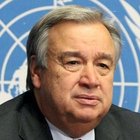The meeting participants discussed a broad array of topics related to climate change, including setting a new collective quantitative goal for climate finance, addressing climate mitigation and adaptation, and the issue of decision-making regarding the implementation of Article 6 mechanisms of the Paris Agreement.
On the sidelines of the event, Ruslan Edelgeriyev held a series of working meetings with UN Secretary-General Antonio Guterres, UNFCCC Executive Secretary Simon Stiell, Minister of Ecology and Natural Resources of Azerbaijan, president of the 29th session of the Conference of the Parties to the UN Framework Convention on Climate Change Mukhtar Babayev, and representatives from several other countries.
The Aide to the Russian President emphasised the importance of maintaining the existing consensus decisions from the 28th session of the Conference of the Parties in Dubai, UAE, when addressing the issue of financing for developing countries. The parties agreed on the need to uphold the provisions of the Paris Agreement and the UN Framework Convention on Climate Change and highlighted the importance of preserving the principle of common but differentiated responsibility among states.
The 29th session of the Conference of the Parties in Baku concluded with the signing of an agreement establishing a new collective quantitative target for climate finance. The document emphasises, in particular, the leading role of developed countries in providing developing nations with US$300 billion annually until 2035 to reduce greenhouse gas emissions and adapt to climate change.
Through collaboration with other parties, the Russian delegation successfully ensured the exclusion from the final text of provisions that could be ambiguously interpreted and aimed at a complete rejection of hydrocarbons and an unjustified expansion of the list of donor states required to finance climate change mitigation measures in developing countries.
It was also possible to secure the adoption of decisions on Article 6 of the Paris Agreement, which will enable more effective cooperation in the implementation of climate projects and the establishment of an international carbon market.

